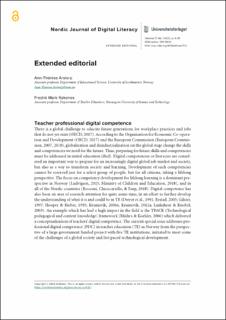| dc.description.abstract | There is a global challenge to educate future generations for workplace practices and jobs that do not yet exist (OECD, 2017). According to the Organisation for Economic Co-operation and Development (OECD, 2017) and the European Commission (European Commission, 2007, 2018), globalization and deindustrialization on the global stage change the skills and competencies we need for the future. Thus, preparing for future skills and competencies must be addressed in initial education (ibid). Digital competencies or literacies are considered an important way to prepare for an increasingly digital global job market and society, but also as a way to transform society and learning. Development of such competencies cannot be reserved just for a select group of people, but for all citizens, taking a lifelong perspective. The focus on competency development for lifelong learning is a dominant perspective in Norway (Ludvigsen, 2015; Ministry of Children and Education, 2018), and in all of the Nordic countries (Bocconi, Chioccariello, & Earp, 2018). Digital competence has also been an area of research attention for quite some time, in an effort to further develop the understanding of what it is and could be in TE (Dwyer et al., 1991; Erstad, 2005; Gilster, 1997; Hooper & Rieber, 1995; Krumsvik, 2006a; Krumsvik, 2012a; Lankshear & Knobel, 2003). An example which has had a high impact in the field is the TPACK (Technological pedagogical and content knowledge) framework (Mishra & Koehler, 2006) which delivered a conceptualization of teachers’ digital competence. The current special issue addresses professional digital competence (PDC) in teacher education (TE) in Norway from the perspective of a large government funded project with five TE institutions, initiated to meet some of the challenges of a global society and fast paced technological development. | en_US |

